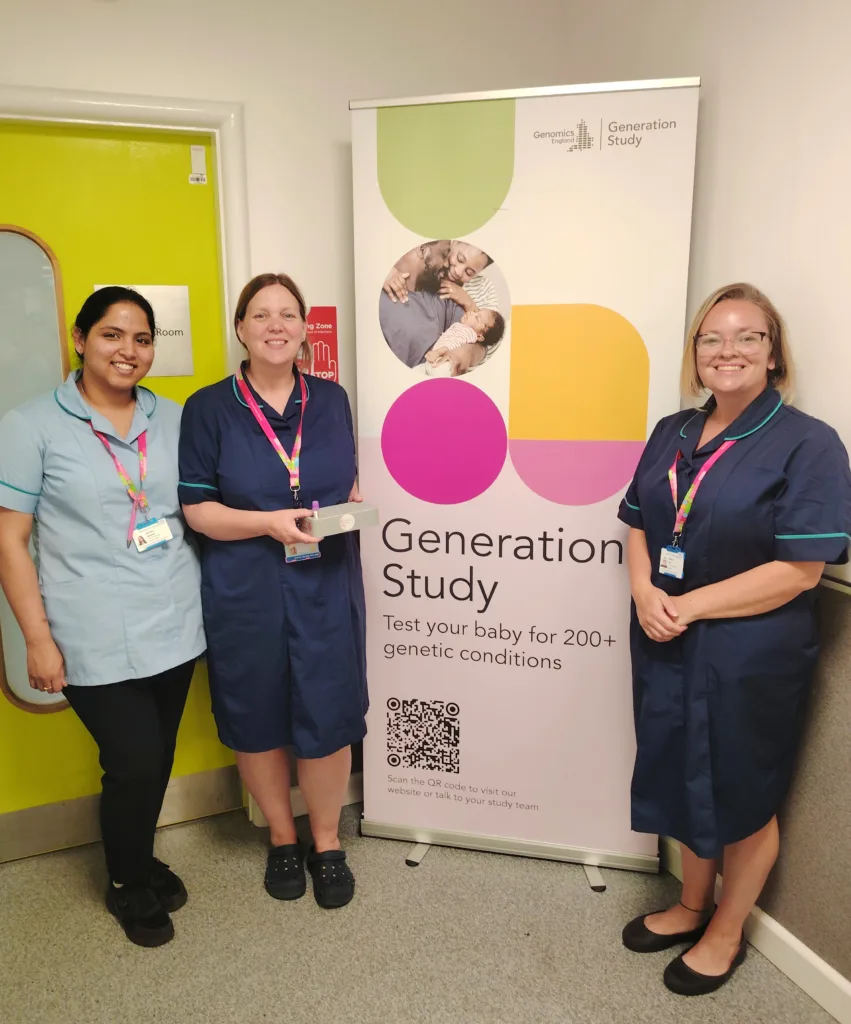Thousands of babies have begun to be tested for over 200 rare genetic conditions as part of a world-leading study that aims to screen up to 100,000 newborns in England.
Bradford Teaching Hospitals is one of a number of NHS hospitals taking part in the pioneering study which aims to identify conditions in babies sooner and could enable hundreds to benefit from earlier diagnosis and treatment, that could help slow the progression of disease and improve or even extend their lives.
The Generation Study, led by Genomics England in partnership with NHS England, will see newborn babies offered whole genome sequencing using blood samples which are usually taken from their umbilical cord shortly after birth.
The sequencing identifies treatable, rare conditions shortly after a baby is born rather than when symptoms might appear later in childhood. This means families can access the right support, monitoring, and treatment from the NHS much earlier for these conditions.
The Generation Study will identify more than 200 conditions in otherwise asymptomatic babies where symptoms might not present until later in childhood.
Principal Investigators, Neonatal Intensive Care Consultant, Catriona Firth and Research Midwife, Jenny Butler, are leading the research project which is based at the Bradford Royal Infirmary, part of Bradford Teaching Hospitals NHS Foundation Trust.
Dr Firth said: “Early effective intervention can help to prevent longer term health problems associated with certain conditions, keeping children out of hospital, and helping them live healthier lives.
“Expectant parents will be informed about the study during pregnancy, and if interested a research midwife will have a detailed conversation with them to decide if they want to take part.
“Shortly after birth, a midwife will confirm with parents that they are still happy for their baby to be tested and a blood sample will be taken from the afterbirth and sent to a laboratory for whole genome sequencing.
“Results are then reviewed by NHS genomic scientists, with the aim of sharing with parents within 28 days if a condition is suspected or within a few months if no conditions are suspected.”
If a newborn baby is identified as having a treatable childhood condition through the genome sequencing, families and carers will be provided with further NHS testing to confirm a diagnosis, and ongoing support and treatment from the NHS.
It is hoped that screening a baby’s entire genome – all of their DNA – could detect hundreds more rare, treatable diseases in their first years of life.
Dr Rich Scott, Chief Executive Officer at Genomics England said: “The launch of the Generation Study is a pivotal moment as we look to develop evidence on whether genomic newborn screening should be offered to all children – to do more for the thousands of children born every year in the UK with a treatable genetic condition.
“Children with these conditions often go years without receiving a diagnosis. Cutting this time would mean earlier access to what can be life-changing treatment. The Generation Study also shows the impact of our partnership with the NHS – meaning that the UK is uniquely placed to test, and, where proven, roll out genomic innovations to improve health and help us move healthcare increasingly to preventing illness”.
Rebecca Leon, Senior Clinical Research Midwife at Bradford Teaching Hospitals said: “We are excited to offer this incredible opportunity to the families of Bradford, and welcome those who are currently expecting a baby to get in touch with our dedicated team of research midwives, by emailing generation.study@bthft.nhs.uk to discuss how to take part. All families will receive Generation Study information in their pregnancy booking back and will be offered the opportunity to take part in this important study during their pregnancy.”
NHS teams will also provide families with advice on how to manage different conditions. For example, one of the conditions, osteogenesis imperfecta, parents can be advised on handling of their newborn to prevent long-term damage to their child’s bones.
The study will support broader healthcare research to improve testing and discover more treatments and explore the potential of storing an individual genome over a person’s lifetime and using it to help predict, diagnose and treat future illnesses. For example, if a child who has had their genome sequenced falls sick when they are older, there may be an opportunity to use their stored genetic information to help diagnose and treat them.
Genomics England is owned by the Department of Health and Social Care.

